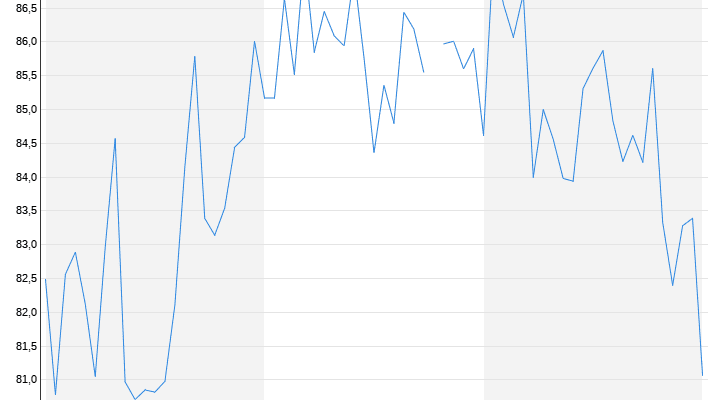Criticism of pricing policy in Europe
Meager revenues cloud Novartis’ shareholder wellness
2/1/2023, 6:17 p.m
Novartis flatters its shareholders with a higher dividend and additional billions for a possible share buyback. But on the stock exchange, this initially does not trigger any storms of jubilation. The reason for this is the missed expectations in the last quarter of the year.
The Swiss pharmaceutical company Novartis promises its shareholders more money. The dividend is to be increased by CHF 0.10 to CHF 3.20 per share after growth in sales and operating profit in the past year, as announced by the drug manufacturer from Basel. In addition, Novartis intends to obtain approval for further share buybacks of up to ten billion francs at the upcoming Annual General Meeting.
Another buyback has not yet been decided, said CEO Vasant Narasimhan. “This authorization gives us the flexibility to conduct additional share repurchases of up to $10 billion. There is no obligation to conduct these share repurchases at this time.” He also promised further increases in dividends.
After selling a multi-billion dollar block of Roche shares in 2021, Novartis started buying back its own shares for up to $15 billion. According to the group, $4.9 billion of this program is still open. On the stock exchange, the prospect of more open money floodgates did not cause any euphoria. With a price minus, Novartis was one of the weakest stocks both among the Swiss blue chips and the European healthcare stocks.
sales disappointed
Above all, sales development triggered skepticism. “The fourth quarter of 2022 offers a mixed picture with some weaknesses in sales,” explained ZKB analyst Laurent Flamme. Vontobel expert Stefan Schneider takes a similar view: “The fourth quarter was convincing with a strong profit margin, but missed the consensus expectations in terms of sales”. According to Citigroup, the development in the final quarter was not very convincing. The company’s outlook for 2023 is in line with expectations and shows noticeable sales weakness at Cosentyx, Zogensma, Leqavo and Lucentis.
Excluding exchange rate fluctuations, Novartis increased its sales revenue by four percent to just under $50.6 billion last year. Earnings adjusted for special items grew by eight percent to $16.7 billion, also thanks to austerity measures. The company thus just barely achieved its sales growth target and performed slightly better in terms of operating profit. Bottom line, profit fell 71 percent to just under $7 billion after the sale of the Roche package in 2021 boosted net income.
Year-to-date, currency-neutral sales from continuing operations are expected to increase by a low- to mid-single-digit percentage and adjusted operating income by a mid- to high-single-digit percentage. The Sandoz generics division, which is about to be spun off, is not included in this forecast. According to Novartis, the spin-off planned for the second half of the year is on course.
However, Novartis CEO Vasant Narasimhan warned that drug pricing policies are making Europe less attractive to invest in drug development. “I think it’s important for European governments to prioritize healthcare and prioritize investing in bringing innovative medicines to their populations in order to maintain a robust innovation ecosystem that companies want to invest in over the long term,” he said. According to Narasimhan, Germany offers a comparatively positive environment in Europe.
China still lucrative
Despite the shrinking population, the group continues to see major growth opportunities in China. “If you look at the unmet need in China for the treatment of many chronic diseases, it is significant,” Narasimhan said. The population is aging, the government is ready to speed up the approval of medicines, and thanks to reimbursement of costs, broader sections of the population have access to new medicines. “So we think that China will remain a very attractive market in the medium term, the second largest pharmaceutical market in the world,” said the Novartis boss.
The group has declared China to be one of its four key markets – alongside the USA, Japan and Germany. According to Narasimhan, Novartis has invested heavily in its presence in China, and not just in big cities. In the country, the company focuses primarily on therapies for cardiovascular diseases, cancer and neurological diseases. In the dominant business with patent-protected medicines, Novartis achieved sales of 2.9 billion dollars in China in 2022 – excluding exchange rate fluctuations, an increase of seven percent.
